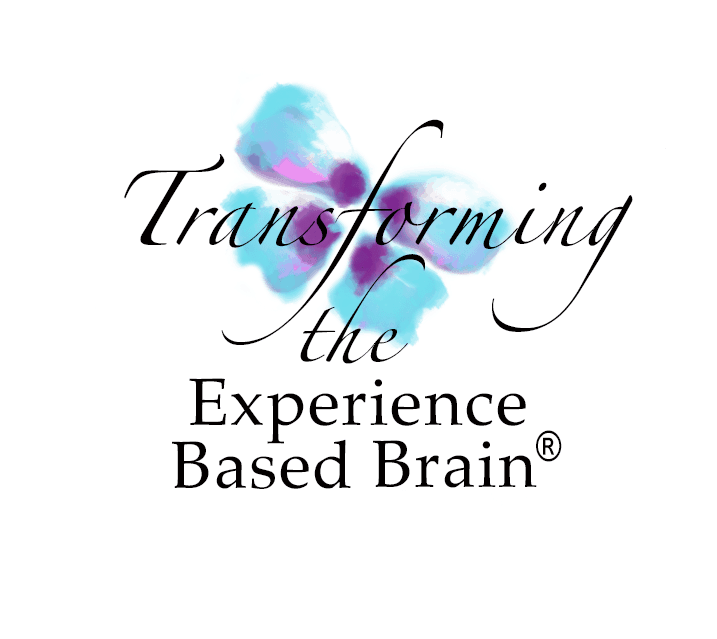"Healing is fluid. Healing can not be held down to logic"...sterrell 12:01:21
Meet the Teaching Team
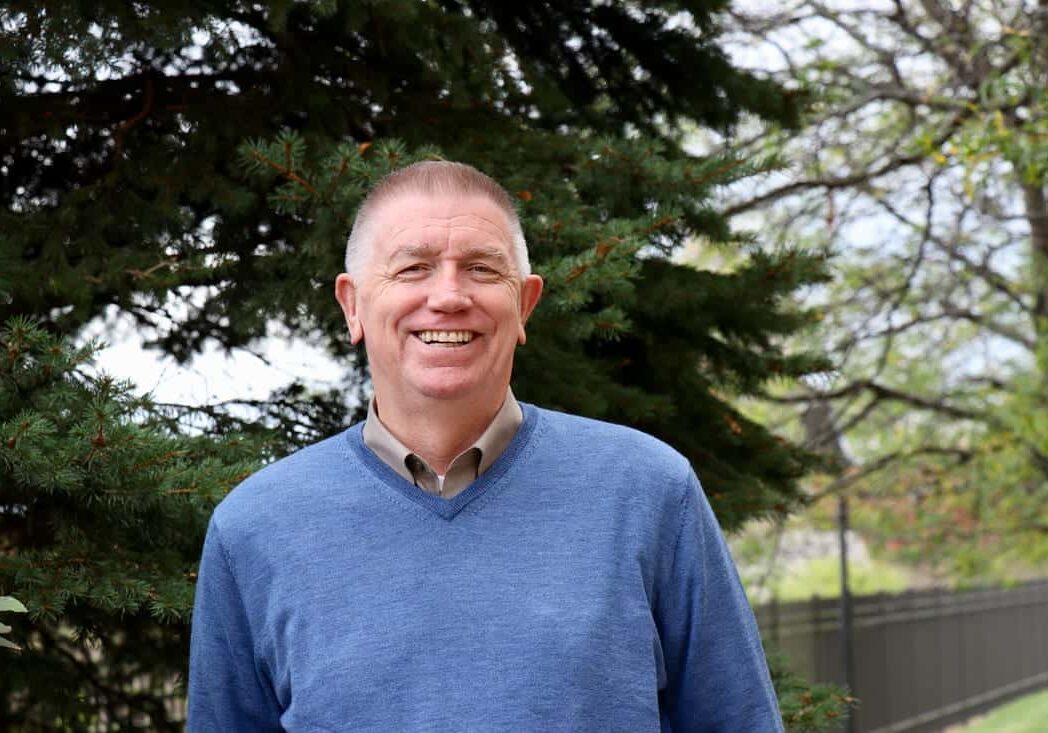
- Stephen Terrell, PsyD Lead Facilitator
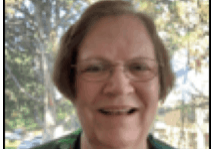
- Ellen Keating, PsyD Lead Facilitator
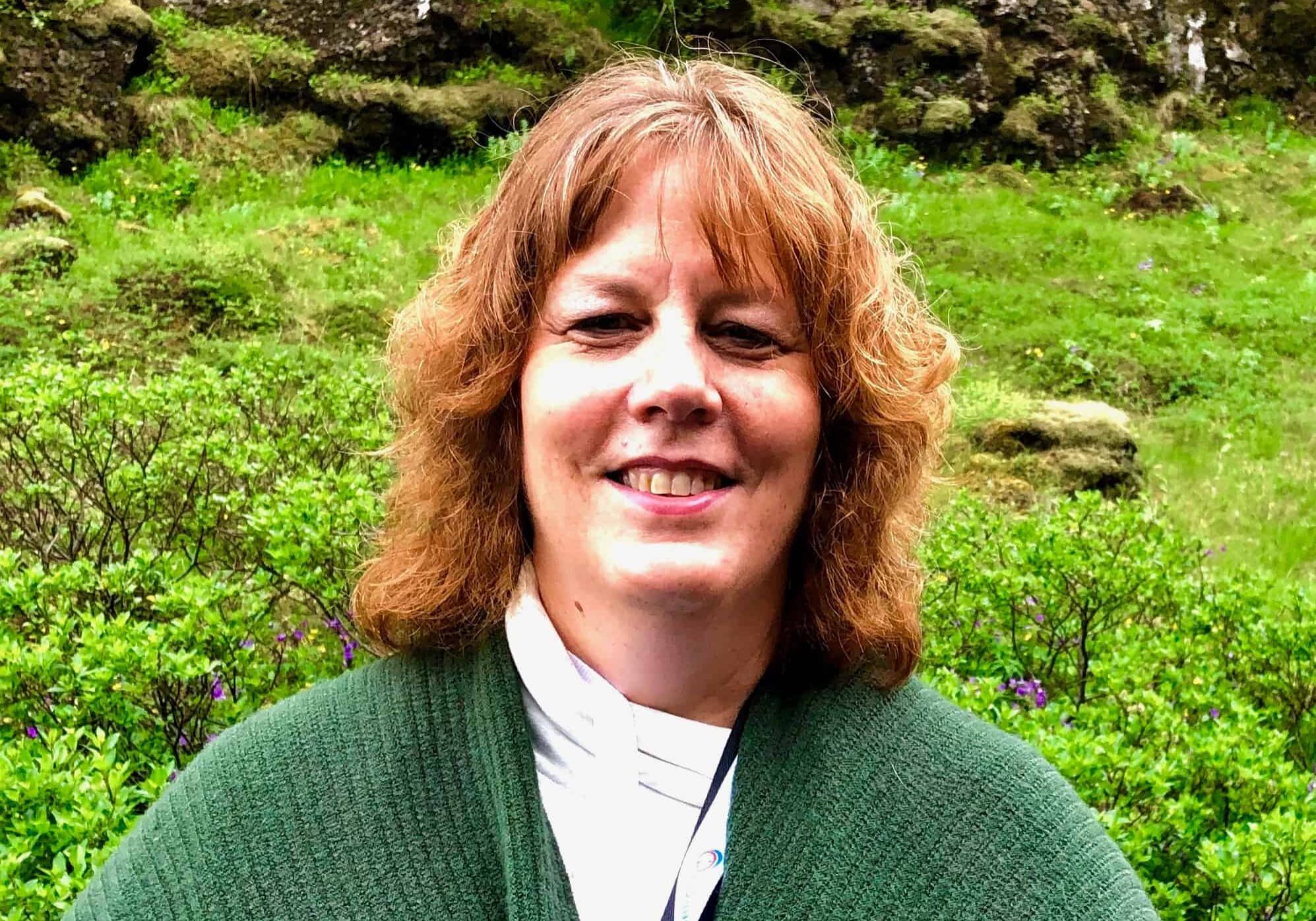
- Robin Sullivan, MA, LMFT Lead Assistant

- Heather Smith Administrative Lead
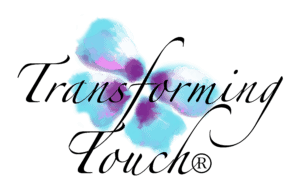
Become a Transforming Touch® Practitioner
Join the thousands of Practitioners implementing Transforming Touch®'s scientific Regulation-Focused Approach for treating Trauma. Transforming Touch® Practitioners implement a series of Regulation-Focused Enhancements to improve regulation and reduce the effects of early stress and trauma on the nervous system. Transforming Touch® Regulation-Focused Approach can be a stand-alone treatment modality for treating complex or Developmental Trauma, or it can be used to support the effectiveness of other modalities. We often discover that those with who experience shock trauma have an underlying developmental trauma.
We offer students several ways to learn Transforming Touch®: 1.) Transforming Intentional Touch is the primary focus of the Online Learning. We have found many students are not able to travel for many different reasons. This way you will complete the Skills Building portion of the training online with other students in breakout rooms over Zoom®. You will also receive access to in person demos and can ask questions about working in person. 2.) For those considering learning Transforming Touch® in person, we offer a hybrid program to reduce the student's expenses. The majority of lectures are prerecorded and we ask that you review all the videos prior to the start of the program. On site, you will work in triads and have some lecture time. 3.) Independent Learning for those who want to join a class that is in progress or prefer learning on a 1:1, approach where they will work directly with a Senior Assistant for the Skills Building portion of the training.
To reduce your cost of learning Transforming the Experience-Based Brain® and becoming a Transforming Touch® Practitioner, we have designed a two-part training experience for students. All the lectures are taught through pre-recorded videos online for each of our learning approaches. The Skill Building portion is taught in-person, online, or 1:1. This reduces time away from home costs and travel-related costs.
Transforming Touch® Practitioners complete all three modules and show competency during the Skill Building experience along with the following requirements:
1.) Complete all 3 modules of Transforming Touch® training and be in good standing.
2.) All students my complete 12 hours of personal sessions (with an approved provider) and 6 hours of consultation (you can receive credit with individual consultations with an approved provider or by attending the free consultations with Ellen on Tuesday or Steve or Robin on Thursdays.)
All modules and associated requirements must be completed prior to receiving the Transforming Touch® Practitioner Certificate.
- Module 1:
Recommend 4 personal sessions with approved provider and 2 credits hours of case consultations - Module 2:
Recommend 4 personal sessions with approved provider and 2 credits hours of case consultations - Module 3:
Recommend 4 personal sessions with approved provider and 2 credits hours of case consultations
Case Consultation and Personal Session Details
The one-on-one Personal Sessions provided for credit throughout the training are intended as a support for the students’ experiential learning process of Transforming Touch®, although it is understood that these sessions may also contribute to the learner’s personal growth and development. All information shared with the provider and held strictly confidential.
In a Personal Session, students experience Transforming Touch® from the client perspective, and experience how the Transforming Touch® Practitioner has integrated Transforming Touch® into their practices. The sessions provided in this context allow Transforming Touch® Practitioners to share knowledge and expertise with students as they learn to integrate Transforming Touch® within their scope of practice.
The one-on-one Individual Case Consultations provided for credit through the training give students the opportunity to examine the application of Transforming Touch® with their clients through the services provided by an approved Transforming Touch® Consultation Provider. These Case Consults reinforce the student’s
Transforming Touch® skill development and professional development (i.e., countertransference, scope of practice, etc.).
These Case Consultations are a professional service focused on the application and integration of Transforming Touch® into a student’s professional practice.
Group Case Consultations provided for credit throughout the training include elements of the teaching function; Like Individual Case Consultations, these group consultations provide students the opportunity to examine the application of Transforming Touch® with their clients through the services provided by an approved Consultation Provider as they address the questions of all group participants.
Case Consultations reinforce students’ Transforming Touch® development and professional development (i.e., countertransference, scope of practice etc.).
It is strongly recommended that personal sessions and case consultations are distributed throughout the training as indicated above to receive maximum educational benefit. This will ensure receipt of valuable input and support as students progress through the training.
In the case that all recommended credits are not completed before commencement of the current training year, students may receive sessions and consultations at times that meet the students needs better.
What is Transforming the Experience-Based Brain®?
Transforming the Experience-Based Brain (TEB) is a "Trauma-Informed" modality that implements Regulation-Focused Approach to the repair and healing of Developmental Trauma. The modality is based on the idea that when there are ruptures during early platform development, they continue to disrupt a person's life. TEB incorporates presence, regulation, and relationship to repair these ruptures.
Transforming the Experience-Based Brain (TEB) creates a Safe Haven where the client can begin to experience a sense of trust between themselves and the therapist. Even though these changes may be subtle, they hold powerful consequences for our client.
Transforming the Experience-Based Brain (TEB) allows for a series of ruptures and repairs. This creates the opportunity to redesign those earlier platforms.
Transforming the Experience-Based Brain (TEB) supports the importance of presence and relationship. John Bowlby's work showed us the importance of the Secure Base while growing and healing. This relationship supports the client's transition from insecure attachment to earned secure attachment. This transition opens the way for the client to show increased vulnerability which increases the potential for healing..
Transforming the Experience-Based Brain (TEB) reflects the understandings of Developmental Trauma and relies on studies such as Adverse Childhood Experience Study. This study shows the importance of intervention in someone's life who was exposed to Developmental Trauma. Intervention can and will prevent a lifetime of disease.
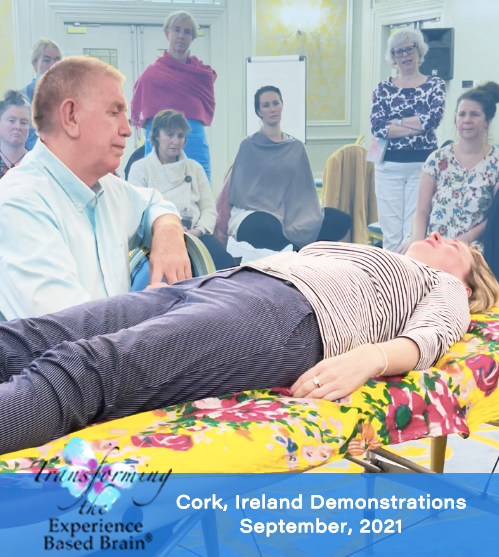
Get Training Updates
Who is this training for?
This training is open to all those who support healing in others, those who work in a therapeutic or educational setting, including but not limited to the following:
- Psychiatrist, Psychotherapist, Counselors, Marriage and Family Therapists, Social Workers, Art or Music Therapist
- Medical Doctor, Registered Nurse, Chiropractor
- Body Worker, Acupuncturist, Massage Therapist, Biodynamic Cranial Sacral Therapy
- or attended Somatic Experiencing Training, Sensory Motor Training, Hakomi Training, or a Somatic Training Program, Touch Skills for Therapist, or Somatic Resilience and Regulation
- Currently have a "Healing" practice
- If you are unsure about your qualifications, please reach out to the training site coordinator
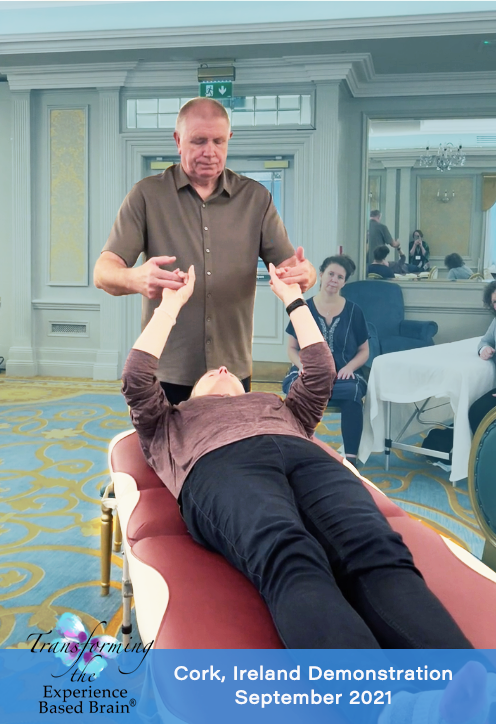
Transforming Touch® Practitioner Training IT'S HYBRID
"You can learn either in person, online, or Independent Learning"

Virtual Transforming Touch® Training
-
Watch pre-recorded lectures online at your own pace
-
Watch all demos online at your own pace
-
3 full days of Skill Building Intentionally online
-
Triads in Break out rooms during Skill Building
-
No travel or lodging expenses

Virtual 2 Transforming Touch® Training
-
Watch pre-recorded lectures online at your own pace
-
Watch all demos online at your own pace
-
Learn 6 Enhancements online with Senior Assistant
-
Triads in Break out rooms during Skill Building
-
No travel or lodging expenses

Live Transforming Touch® Training
-
Watch pre-recorded lectures online at your own pace
-
Watch all demos online at your own pace
-
3.5 days of Skill Building at location with peers
-
Triads with other students live during training.
-
Review of Enhancements onsite
Two Ways to Learn and Apply Transforming the Experience-Based Brain to your practice:
Transforming Presence is an effective way of facilitating regulation within our client's nervous systems. The protocols and enhancements are designed to work with or without physical touch. The power of working with intention has been shared from therapists around the world. Some believe it is stronger than using physical touch. Transforming Presence is an effective treatment for those who work in agencies that prohibit physical touch and for those limited by licensure laws. This is also the chosen path for telemedicine.
Transforming Touch® is an effective way of facilitating regulation within our client's nervous systems using physical touch. The protocols and enhancements are designed to work with or without physical touch. Those who touch begin to bring awareness to the space and to their own presence. This awareness and consistently enhances a client's level of healing.
Testimonials
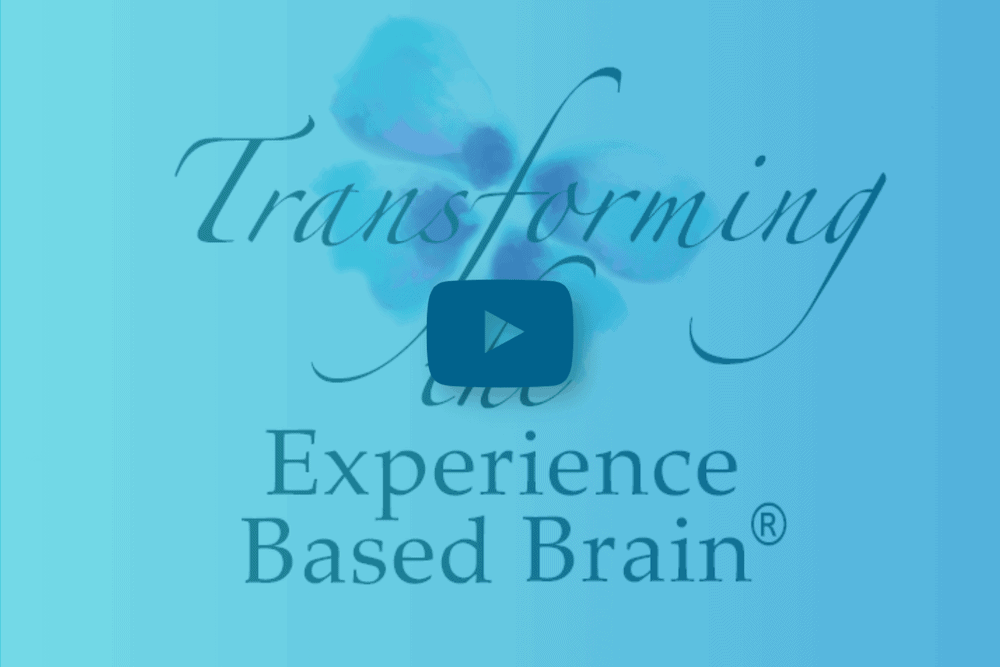
- Mina Roustayi TEB Graduate

- Gerardine Boyle TEB Graduate

- Anita Mandley TEB Graduate & Senior Assistant
From a movie that Jodie saw following a day of Skill Building:
When you are underwater for months time, You lose all sense of day and night.
And there is only awake and dreaming.
It's not that those things are easy to distinguish.
- Underwater
- Jodie
Over the last year and a half, I had experienced knee, hip, and back pain that was partially and temporarily relieved with massage. I was referred by a friend to work with Tammy for what I thought was a traditional massage. After meeting in person with Tammy for the first time and hearing an explanation of her process, I was intrigued by the possibility that she may actually be able to address the root of my pain and possibly provide me more permanent pain relief.
- Tammy Lord, BS, LMT, RY aka Spirit Speaker TEB Graduate
Module Objectives
MODULE 1
- Shock vs Developmental Trauma
- Threat Response and Stresses
- Implicit vs Explicit Memory
- Locus of Control
- Internal
- External
- Autonomic Nervous System
- Self Regulation
- Co-Regulation
- Hierarchy of Healing
- Homeostasis
- Allostatic Load
- Transforming Touch® vs Transforming Intentional Touch
- Transforming Ethics
- The Four Agreements
- Bowlby's 4 points of Healing
- Seven Point Protocol
- Therapeutic Centering
- Types of Touch
- Enhancements
- 7 Point Protocol
- Triangle of Healing
- Fear Paralysis Reflex
- Palmar/ Grasp Primitive Reflex
- Tonic Labyrinthine
- Asymmetrical Tonic Neck Reflex
MODULE 2
- Polyvagal Theory
- Adverse Childhood Experience Study
- Dorsal States
- Window of Tolerance
- Faux Window of Tolerance
- Sympathetic Response
- Parasympathetic Response
- Defensive Accommodations
- Language of Trauma RepairRupture and Repair
- Review Attachment Theory
- Secure Survival Attachment
- Anxious-Resistant Survival Attachment
- Avoidant Survival Attachment
- Disorganized
- Erikson's Psychosocial Development Theory
- Safe Haven and Missattunement
- Hypothalamus-Pituitary-Adrenal Axis
- Cortisol
- Adrenaline / Epineferine
- Rooting/sucking reflex
- Palmar Grasp Reflex
- Asymmetrical Tonic Neck Reflex
- The Midline and why it is important
- Enhancements:
- Spinal Galant
- Moro Reflex
- Rooting Reflex
- Sucking Reflex
- Landau Primitive Reflex
- Symmetrical Tonic Neck Reflex
MODULE 3
- Neuroception vs Interoception
- 4 Layers, Physical, Intellectual
Emotional & Spiritual - Over Coupled vs Under Coupled
- Pendulation & Titration
- The Digestive System
- Eating Disorders
- Story Telling
- Shame
- Grief/Loss
- Anxiety & Separation
- Connecting the Process
- Enhancements:
- H-P-A axis
- Over-Coupling
- Under-Coupling
- Vagus Nerve
- Digestive System
- Layers
References For The Use Of Touch
Ahles, T. A. et al. Massage therapy for patients undergoing autologous bone marrow transplantation. J. Pain. Symptom Manag. 18, 157–163 (1999).
Ainsworth M. (1979). “Attachment as related to mother-infant interaction” in Advances in the study of behavior. eds. Rosenblatt J., Hinde R., Beer C., Busnel M. -C. (New York: Academic Press; ), 1–51.
Albert, N. M. et al. A randomized trial of massage therapy after heart surgery. Heart Lung38, 480–490 (2009).
Anders S, Heinzle J, Weiskopf N, Ethofer T, Haynes JD. Flow of Affective Information Between Communicating Brains. Neuroimage (2011) 54:439–46. doi: 10.1016/j.neuroimage.2010.07.004
Anderson S. E., Keim S. A. (2016). Parent-child interaction, self-regulation, and obesity prevention in early childhood. Curr. Obes. Rep. 5, 192–200. 10.1007/s13679-016-0208-9, PMID: - DOI - PMC - PubMed
Ang, J. Y. et al. A randomized placebo-controlled trial of massage therapy on the immune system of preterm infants. Pediatrics 130, e1549–e1558 (2012
Ardiel, E. L. & Rankin, C. H. The importance of touch in development. Paediatr. Child Health 15, 153–156 (2010).
Arditi, H., Feldman, R. & Eidelman, A. I. Effects of human contact and vagal regulation on pain reactivity and visual attention in newborns. Dev.Psychobiol. 48, 561–573 (2006).
Aron, L., and Anderson, F. S. Eds. (1998). Relational perspectives on the body. The Analytic Press.
Arora, J., Kumar, A. & Ramji, S. Effect of oil massage on growth and neurobehavior in very low birth weight preterm neonates. Indian Pediatr. 42, 1092–1100 (2005).
Asadollahi, M., Jabraeili, M., Mahallei, M., Asgari Jafarabadi, M. & Ebrahimi, S. Effects of gentle human touch and field massage on urine cortisol level in premature infants: a randomized, controlled clinical trial. J. Caring Sci. 5, 187–194 (2016).
Bales K. L., Witczak L. R., Simmons T. C., Savidge L. E., Rothwell E. S., Rogers F. D., et al. . (2018). Social touch during development: long-term effects on brain and behavior. Neurosci. Biobehav. Rev. 95, 202–219. 10.1016/j.neubiorev.2018.09.019, PMID: - DOI - PubMed
Basiri-Moghadam, M., Basiri-Moghadam, K., Kianmehr, M. & Jani, S. The effect of massage on neonatal jaundice in stable preterm newborn infants: a randomized controlled trial. J. Pak. Med. Assoc. 65, 602–606 (2015).
Bauer, B. A. et al. Effect of massage therapy on pain, anxiety, and tension after cardiac surgery: a randomized study. Complement. Ther. Clin. Pract. 16, 70–75 (2010).
Beijers, R., Cillessen, L. & Zijlmans, M. A. C. An experimental study on mother-infant skin-to-skin contact in full-terms. Infant Behav. Dev. 43, 58–65 (2016).
Bendas, J., Ree, A., Pabel, L., Sailer, U. & Croy, I. Dynamics of affective habituation to touch differ on the group and individual level. Neuroscience 464, 44–52 (2021).
Bergman, N., Linley, L. & Fawcus, S. Randomized controlled trial of skin-to-skin contact from birth versus conventional incubator for physiological stabilization in 1200- to 2199-gram newborns. Acta Paediatr. 93, 779–785 (2004).
Bigelow, A., Power, M., MacLellan‐Peters, J., Alex, M. & McDonald, C. Effect of mother/infant skin‐to‐skin contact on postpartum depressive symptoms and maternal physiological stress. J. Obstet. Gynecol. Neonatal Nurs. 41, 369–382 (2012).
Billhult, A., Bergbom, I. & Stener-Victorin, E. Massage relieves nausea in women with breast cancer who are undergoing chemotherapy. J. Altern. Complement. Med. 13, 53–57 (2007).
Billhult, A., Lindholm, C., Gunnarsson, R. & Stener-Victorin, E. The effect of massage on cellular immunity, endocrine and psychological factors in women with breast cancer—a randomized controlled clinical trial. Auton. Neurosci. 140, 88–95 (2008).
Brand LR, Munroe DJ, Gavin J. The effect of hand massage on preoperative anxiety in ambulatory surgery patients. AORN J. (2013) 97:708–17. doi: 10.1016/j.aorn.2013.04.003
Braun, L. A. et al. Massage therapy for cardiac surgery patients—a randomized trial. J. Thorac. Cardiovasc. Surg. 144, 1453–1459 (2012).
Burleson MH, Davis MC. 10 social touch and resilience. In: Kent M, Davis MC, ReichRoutledge JW, editors. The Resilience Handbook: Approaches to Stress and Trauma. London: Routledge (2013). p. 131.
Cabibihan, J.-J. & Chauhan, S. S. Physiological responses to affective tele-touch during induced emotional stimuli. IEEE Trans. Affect. Comput. 8, 108–118 (2017).
Campeau, M.-P. et al. Impact of massage therapy on anxiety levels in patients undergoing radiation therapy: randomized controlled trial. J. Soc. Integr. Oncol. 5, 133–138 (2007).
Can, Ş. & Kaya, H. The effects of yakson or gentle human touch training given to mothers with preterm babies on attachment levels and the responses of the baby: a randomized controlled trial. Health Care Women Int. 43, 479–498 (2021).
Carfoot, S., Williamson, P. & Dickson, R. A randomised controlled trial in the north of England examining the effects of skin-to-skin care on breast feeding. Midwifery 21, 71–79 (2005).
Cascio CJ, Moore D, McGlone F. Social touch and humandevelopment. Dev Cogn Neurosci. (2019) 35:5–11. doi: 10.1016/j.dcn.2018.04.009
Castral, T. C., Warnock, F., Leite, A. M., Haas, V. J. & Scochi, C. G. S. The effects of skin-to-skin contact during acute pain in preterm newborns. Eur. J. Pain. 12, 464–471 (2008).
Cattaneo, A. et al. Kangaroo mother care for low birthweight infants: a randomized controlled trial in different settings. Acta Paediatr. 87, 976–985 (1998).
Charpak, N., Ruiz-Peláez, J. G. & Charpak, Y. Rey-Martinez kangaroo mother program: an alternative way of caring for low birth weight infants? One year mortality in a two cohort study. Pediatrics 94, 804–810 (1994).
Charpak, N., Montealegre‐Pomar, A. & Bohorquez, A. Systematic review and meta‐analysis suggest that the duration of Kangaroo mother care has a direct impact on neonatal growth. Acta Paediatr. 110, 45–59 (2021).
Chermont, A. G., Falcão, L. F. M., de Souza Silva, E. H. L., de Cássia Xavier Balda, R. & Guinsburg, R. Skin-to-skin contact and/or oral 25% dextrose for procedural pain relief for term newborn infants. Pediatrics 124, e1101–e1107 (2009).
Chi Luong, K., Long Nguyen, T., Huynh Thi, D. H., Carrara, H. P. O. & Bergman, N. J. Newly born low birthweight infants stabilise better in skin-to-skin contact than when separated from their mothers: a randomised controlled trial. Acta Paediatr. 105, 381–390 (2016).
Cho, E.-S. et al. The effects of kangaroo care in the neonatal intensive care unit on the physiological functions of preterm infants, maternal–infant attachment, and maternal stress. J. Pediatr. Nurs. 31, 430–438 (2016).
Choi, H. et al. The effects of massage therapy on physical growth and gastrointestinal function in premature infants: a pilot study. J. Child Health Care 20, 394–404 (2016).
Choudhary, M. et al. To study the effect of Kangaroo mother care on pain response in preterm neonates and to determine the behavioral and physiological responses to painful stimuli in preterm neonates: a study from western Rajasthan. J. Matern. Fetal Neonatal Med. 29, 826–831 (2016).
Christensson, K. et al. Temperature, metabolic adaptation and crying in healthy full-term newborns cared for skin-to-skin or in a cot. Acta Paediatr. 81, 488–493 (1992).
Coan JA, Schaefer HS, Davidson RJ. Lending a hand: Social regulation of the neural response to threat. Psychol Sci. (2006) 17:1032–9. doi: 10.1111/j.1467-9280.2006.01832.x
Cong, X. et al. Effects of skin-to-skin contact on autonomic pain responses in preterm infants. J. Pain. 13, 636–645 (2012).
Cong, X., Ludington-Hoe, S. M., McCain, G. & Fu, P. Kangaroo care modifies preterm infant heart rate variability in response to heel stick pain: pilot study. Early Hum. Dev. 85, 561–567 (2009).
Cong, X., Ludington-Hoe, S. M. & Walsh, S. Randomized crossover trial of kangaroo care to reduce biobehavioral pain responses in preterm infants: a pilot study. Biol. Res. Nurs.13, 204–216 (2011).
Cutshall, S. M. et al. Effect of massage therapy on pain, anxiety, and tension in cardiac surgical patients: a pilot study. Complement. Ther. Clin. Pract. 16, 92–95 (2010).
Dalili, H., Sheikhi, S., Shariat, M. & Haghnazarian, E. Effects of baby massage on neonatal jaundice in healthy Iranian infants: a pilot study. Infant Behav. Dev. 42, 22–26 (2016).
Debrot A, Schoebi D, Perrez M, Horn AB. Touch as an interpersonal emotion regulation process in couples' daily lives: the mediating role of psychological intimacy. Pers Soc Psychol Bull. (2013) 39:1373–85. doi: 10.1177/0146167213497592
Diego MA, Field T. Moderate pressure massage elicits a parasympathetic nervous system response. Int J Neurosci. (2009) 119:630–8. doi: 10.1080/00207450802329605
Diego, M. A., Field, T. & Hernandez-Reif, M. Vagal activity, gastric motility, and weight gain in massaged preterm neonates. J. Pediatr. 147, 50–55 (2005).
Diego, M. A., Field, T. & Hernandez-Reif, M. Temperature increases in preterm infants during massage therapy. Infant Behav. Dev. 31, 149–152 (2008).
Diego, M. A. et al. Preterm infant massage elicits consistent increases in vagal activity and gastric motility that are associated with greater weight gain. Acta Paediatr. 96, 1588–1591 (2007).
Diego, M. A. et al. Spinal cord patients benefit from massage therapy. Int. J. Neurosci. 112, 133–142 (2002).
Diego, M. A. et al. Aggressive adolescents benefit from massage therapy. Adolescence 37, 597–607 (2002).
Diego, M. A. et al. HIV adolescents show improved immune function following massage therapy. Int. J. Neurosci. 106, 35–45 (2001).
Dieter, J. N. I., Field, T., Hernandez-Reif, M., Emory, E. K. & Redzepi, M. Stable preterm infants gain more weight and sleep less after five days of massage therapy. J. Pediatr. Psychol. 28, 403–411 (2003).
Ditzen, B. et al. Effects of different kinds of couple interaction on cortisol and heart rate responses to stress in women.Psychoneuroendocrinology 32, 565–574 (2007).
Ditzen B, Neumann ID, Bodenmann G, von Dawans B, Turner RA, Ehlert U, et al. Effects of different kinds of couple interaction on cortisol and heart rate responses to stress in women. Psychoneuroendocrinology. (2007) 32:565–74. doi: 10.1016/j.psyneuen.2007.03.011
Dreisoerner, A. et al. Self-soothing touch and being hugged reduce cortisol responses to stress: a randomized controlled trial on stress, physical touch, and social identity. Compr. Psychoneuroendocrinol. 8, 100091 (2021).
Drescher VM, Gantt WH, Whitehead WE. Heart rate response to touch. Psychosom Med.(1980). 42:559–65. doi: 10.1097/00006842-198011000-00004
Drescher VM, Whitehead WE, Morrill-Corbin ED, Cataldo MF. Physiological and subjective reactions to being touched. Psychophysiology. (1985) 22:96–100. doi: 10.1111/j.1469-8986.1985.tb01565.x
Durkin, J., Jackson, D. & Usher, K. Touch in times of COVID‐19: touch hunger hurts. J. Clin. Nurs. https://doi.org/10.1111/jocn.15488 (2021).
Dunbar RI. The social role of touch in humans and primates: behavioural function and neurobiological mechanisms. Neurosci Biobehav Rev. (2010) 34:260–8. doi: 10.1016/j.neubiorev.2008.07.001
Eaton, M., Mitchell-Bonair, I. L. & Friedmann, E. The effect of touch on nutritional intake of chronic organic brain syndrome patients. J. Gerontol. 41, 611–616 (1986).
Eckstein, M., Mamaev, I., Ditzen, B. & Sailer, U. Calming effects of touch in human, animal, and robotic interaction—scientific state-of-the-art and technical advances. Front. Psychiatry 11, 555058 (2020).
Eckstein M, Becker B, Scheele D, Scholz C, Preckel K, Schlaepfer TE, et al. Oxytocin facilitates the extinction of conditioned fear in humans. Biol Psychiatry. (2015) 78:194–202. doi: 10.1016/j.biopsych.2014.10.015
Edens, J. L., Larkin, K. T. & Abel, J. L. The effect of social support and physical touch on cardiovascular reactions to mental stress. J. Psychosom. Res. 36, 371–382 (1992).
Edwards DJ, Young H, Johnston R. The immediate effect of therapeutic touch and deep touch pressure on range of motion, interoceptive accuracy and heart rate variability: a randomized controlled trial with moderation analysis. Front Integrat Neurosci. 12:41. doi: 10.3389/fnint.2018.00041
Eisenberger NI, Master SL, Inagaki TK, Taylor SE, Shirinyan D, Lieberman MD, et al. Attachment figures activate a safety signal-related neural region and reduce pain experience. Proc Natl Acad Sci USA. (2011) 108:11721–6. doi: 10.1073/pnas.1108239108
El-Farrash, R. A. et al. Longer duration of kangaroo care improves neurobehavioral performance and feeding in preterm infants: a randomized controlled trial. Pediatr. Res.87, 683–688 (2020).
Ellingsen D-M, Leknes S, Løseth G, Wessberg J, Olausson H. The neurobiology shaping affective touch: expectation, motivation, and meaning in the multisensory context. Front Psychol. (2016) 6:1986. doi: 10.3389/fpsyg.2015.01986
Eriksson Hagberg E, Ackerley R, Lundqvist D, Schneiderman J, Jousmäki V, Wessberg J. Spatio-temporal profile of brain activity during gentle touch investigated with magnetoencephalography. NeuroImage. (2019) 201:116024 doi: 10.1016/j.neuroimage.2019.116024
Erlandsson, K., Dsilna, A., Fagerberg, I. & Christensson, K. Skin-to-skin care with the father after cesarean birth and its effect on newborn crying and prefeeding behavior. Birth 34, 105–114 (2007).
Escalona, A., Field, T., Singer-Strunck, R., Cullen, C. & Hartshorn, K. Brief report: improvements in the behavior of children with autism following massage therapy. J. Autism Dev. Disord. 31, 513–516 (2001).
Fattah, M. A. & Hamdy, B. Pulmonary functions of children with asthma improve following massage therapy. J. Altern. Complement. Med. 17, 1065–1068 (2011).
Feldman, R. & Eidelman, A. I. Skin-to-skin contact (kangaroo care) accelerates autonomic and neurobehavioural maturation in preterm infants. Dev. Med. Child Neurol. 45, 274–281 (2003).
Feldman, R., Singer, M. & Zagoory, O. Touch attenuates infants’ physiological reactivity to stress. Dev. Sci. 13, 271–278 (2010).
Feldman, R., Weller, A., Sirota, L. & Eidelman, A. I. Testing a family intervention hypothesis: the contribution of mother–infant skin-to-skin contact (kangaroo care) to family interaction, proximity, and touch. J. Fam.
Ferber, S. G. et al. Massage therapy by mothers and trained professionals enhances weight gain in preterm infants. Early Hum. Dev. 67, 37–45 (2002).
Fidanza, F., Polimeni, E., Pierangeli, V. & Martini, M. A better touch: C-tactile fibers related activity is associated to pain reduction during temporal summation of second pain. J. Pain. 22, 567–576 (2021).
Field, T. et al. Leukemia immune changes following massage therapy. J. Bodyw. Mov. Ther. 5, 271–274 (2001).
Field, T. et al. Benefits of combining massage therapy with group interpersonal psychotherapy in prenatally depressed women. J. Bodyw. Mov. Ther. 13, 297–303 (2009).
Field, T., Delage, J. & Hernandez-Reif, M. Movement and massage therapy reduce fibromyalgia pain. J. Bodyw. Mov. Ther. 7, 49–52 (2003).
Field, T. et al. Fibromyalgia pain and substance P decrease and sleep improves after massage therapy. J. Clin. Rheumatol. 8, 72–76 (2002).
Field, T., Diego, M., Gonzalez, G. & Funk, C. G. Neck arthritis pain is reduced and range of motion is increased by massage therapy. Complement. Ther. Clin. Pract. 20, 219–223 (2014).
Field, T., Diego, M., Hernandez-Reif, M., Deeds, O. & Figueiredo, B. Pregnancy massage reduces prematurity, low birthweight and postpartum depression. Infant Behav. Dev.32, 454–460 (2009).
Field, T. et al. Insulin and insulin-like growth factor-1 increased in preterm neonates following massage therapy. J. Dev. Behav. Pediatr. 29, 463–466 (2008).
Field, T., Diego, M., Hernandez-Reif, M., Schanberg, S. & Kuhn, C. Massage therapy effects on depressed pregnant women. J. Psychosom. Obstet. Gynecol. 25, 115–122 (2004).
Field, T., Diego, M., Hernandez-Reif, M. & Shea, J. Hand arthritis pain is reduced by massage therapy. J. Bodyw. Mov. Ther. 11, 21–24 (2007).
Field, T., Gonzalez, G., Diego, M. & Mindell, J. Mothers massaging their newborns with lotion versus no lotion enhances mothers’ and newborns’ sleep. Infant Behav. Dev. 45, 31–37 (2016).
Field, T. et al. Children with asthma have improved pulmonary functions after massage therapy. J. Pediatr. 132, 854–858 (1998).
Field, T., Hernandez-Reif, M., Diego, M. & Fraser, M. Lower back pain and sleep disturbance are reduced following massage therapy. J. Bodyw. Mov. Ther. 11, 141–145 (2007).
Field, T. et al. Effects of sexual abuse are lessened by massage therapy. J. Bodyw. Mov. Ther. 1, 65–69 (1997).
Field, T. et al. Pregnant women benefit from massage therapy. J. Psychosom. Obstet. Gynecol. 20, 31–38 (1999).
Field, T. et al. Juvenilerheumatoid arthritis: benefits from massage therapy. J. Pediatr. Psychol. 22, 607–617 (1997).
Field, T., Hernandez-Reif, M., Taylor, S., Quintino, O. & Burman, I. Labor pain is reduced by massage therapy. J. Psychosom. Obstet. Gynecol. 18, 286–291 (1997).
Field, T. et al. Massage therapy reduces anxiety and enhances EEG pattern of alertness and math computations. Int. J. Neurosci. 86, 197–205 (1996).
Field, T. et al. Brief report: autistic children’s attentiveness and responsivity improve after touch therapy. J. Autism Dev. Disord. 27, 333–338 (1997).
Field, T. et al. Massage reduces anxiety in child and adolescent psychiatric patients. J. Am. Acad. Child Adolesc. Psychiatry 31, 125–131 (1992).
Field, T. et al. Burn injuries benefit from massage therapy. J. Burn Care Res. 19, 241–244 (1998).
Field T. Touch for socioemotional and physical well-being: a review. Dev Rev. (2010) 30:367–83. doi: 10.1016/j.dr.2011.01.001
Field TM, Hernandez-Reif M, Quintino O, Schanberg S, Kuhn C. Elder retired volunteers benefit from giving massage therapy to infants. J Appl Gerontol. (1998) 17:229–39. doi: 10.1177/073346489801700210
Filho, F. L. et al. Effect of maternal skin-to-skin contact on decolonization of methicillin-oxacillin-resistant Staphylococcus in neonatal intensive care units: a randomized controlled trial. BMC Pregnancy Childbirth https://doi.org/10.1186/s12884-015-0496-1(2015).
Fisher, J.D., Rytting, M., and Heslin, R. (1976). Hands touching hands: Affective and evaluative effects of an interpersonal touch, Sociometry 39, (4), 416 – 421.
Floyd K, Mikkelson AC, Tafoya MA, Farinelli L, La Valley AG, Judd J, et al. Human affection exchange: XIV. relational affection predicts resting heart rate and free cortisol secretion during acute stress. Behav Med. (2007) 32:151–6. doi: 10.3200/BMED.32.4.151-156
Forward, J. B., Greuter, N. E., Crisall, S. J. & Lester, H. F. Effect of structured touch and guided imagery for pain and anxiety in elective joint replacement patients—a randomized controlled trial: M-TIJRP. Perm. J. 19, 18–28 (2015).
Fraser, J. & Ross Kerr, J. Psychophysiological effects of back massage on elderly institutionalized patients. J. Adv. Nurs. 18, 238–245 (1993).
Frey Law, L. A. et al. Massage reduces pain perception and hyperalgesia in experimental muscle pain: a randomized, controlled trial. J. Pain. 9, 714–721 (2008).
Gallace A, Spence C. The science of interpersonal touch: an overview. Neurosci Biobehav Rev. (2010) 34:246–59. doi: 10.1016/j.neubiorev.2008.10.004
Gao, H. et al. Effect of repeated kangaroo mother care on repeated procedural pain in preterm infants: a randomized controlled trial. Int. J. Nurs. Stud. 52, 1157–1165 (2015).
Garner, B. et al. Pilot study evaluating the effect of massage therapy on stress, anxiety and aggression in a young adult psychiatric inpatient unit. Aust. N. Z. J. Psychiatry 42, 414–422 (2008).
Gitau, R. et al. Acute effects of maternal skin-to-skin contact and massage on saliva cortisol in preterm babies. J. Reprod. Infant Psychol. 20, 83–88 (2002).
Givi, M. Durability of effect of massage therapy on blood pressure. Int. J. Prev. Med. 4, 511–516 (2013).
Glover, V., Onozawa, K. & Hodgkinson, A. Benefits of infant massage for mothers with postnatal depression. Semin. Neonatol. 7, 495–500 (2002).
Golaya, S. Touch-hunger: an unexplored consequence of the COVID-19 pandemic. Indian J. Psychol. Med. 43, 362–363 (2021).
Gonzalez, A. et al. Weight gain in preterm infants following parent-administered vimala massage: a randomized controlled trial. Am. J. Perinatol.
Graff TC, Luke SG, Birmingham WC. Supportive hand-holding attenuates pupillary responses to stress in adult couples. PLoS ONE. (2019) 14:e0212703. doi: 10.1371/journal.pone.0212703
Grandin T. Calming effects of deep touch pressure in patients with autistic disorder, college students, and animals. J Child Adolesc Psychopharmacol. (1992) 2:63–72. doi: 10.1089/cap.1992.2.63
Gray, L., Watt, L. & Blass, E. M. Skin-to-skin contact is analgesic in healthy newborns. Pediatrics 105, e14 (2000).
Grewen, K. M., Anderson, B. J., Girdler, S. S. & Light, K. C. Warm partner contact is related to lower cardiovascular reactivity. Behav. Med. 29, 123–130 (2003).
Gordon I, Voos AC, Bennett RH, Bolling DZ, Pelphrey KA, Kaiser MD. Brain mechanisms for processing affective touch. Hum Brain Mapp. (2013) 34:914–22. doi: 10.1002/hbm.21480
Gürol, A. P., Polat, S. & Nuran Akçay, M. Itching, pain, and anxiety levels are reduced with massage therapy in burned adolescents. J. Burn Care Res. 31, 429–432 (2010).
Hama H, Yogo M, Matsuyama Y. Effects of stroking horses on both humans' and horses' heart rate responses. Japan Psychol Res. (1996) 38:66–73. doi: 10.1111/j.1468-5884.1996.tb00009.x
Hari R, Kujala MV Brain Basis of Human Social Interaction: From Concepts to Brain Imaging. Physiol Rev (2009) 89:453–79. doi: 10.1152/physrev.00041.2007
Hari R, Sams M, Nummenmaa L. Attending to and Neglecting People: Bridging Neuroscience, Psychology and Sociology. Phil Trans B (2016) 371:1–9. doi: 10.1098/rstb.2015.0365
Harris, M., Richards, K. C. & Grando, V. T. The effects of slow-stroke back massage on minutes of nighttime sleep in persons with dementia and sleep disturbances in the nursing home: a pilot study. J. Holist. Nurs. 30, 255–263 (2012).
Harris SJ, Papathanassoglou EDE, Gee M, Hampshaw SM, Lindgren L, Haywood A. Interpersonal touch interventions for patients in intensive care: a design-oriented realist review. Nurs Open. (2019) 6:216–35. doi: 10.1002/nop2.200
Hart, S. et al. Anorexia nervosa symptoms are reduced by massage therapy. Eat. Disord.9, 289–299 (2001).
Hasenack, B., Meijer, L.L., Kamps, J.C.C., Mahon, A., Titone, G., Dijkerman, H.C. and Keizer, A. (2023). Longing for touch and quality of life during the COVID-19 pandemic. International Journal of Environmental Research and Public Health, 20, 3855. https://doi.org/10.3390/ ijerph20053855
Hasson U, Ghazanfar AA, Galantucci B, Garrod S, Keysers C Brain-To-Brain Coupling: a Mechanism for Creating and Sharing a Social World. Trends Cognit Sci (2012) 16:114–21. doi: 10.1016/j.tics.2011.12.007
Hattan, J., King, L. & Griffiths, P. The impact of foot massage and guided relaxation following cardiac surgery: a randomized controlled trial. Issues Innov. Nurs. Pract. 37, 199–207 (2002).
Hauser SC, McIntyre S, Israr A, Olausson H, Gerling GJ. Uncovering human-to-human physical interactions that underlie emotional and affective touch communication. In: 2019 IEEE World Haptics Conference, WHC. Tokyo: IEEE (2019). p. 407–12. doi: 10.1109/WHC.2019.8816169
Heatley-Tejada, A., Dunbar, R. I. M. & Montero, M. Physical contact and loneliness: being touched reduces perceptions of loneliness. Adapt. Hum.
Behav. Physiol. 6, 292–306 (2020).
Heller, L., & LaPierre, A. (2012). Healing developmental trauma: How early trauma affects self-regulation, self-image and the capacity for relationship. North Atlantic Books.
Henricson, M., Ersson, A., Määttä, S., Segesten, K. & Berglund, A.-L. The outcome of tactile touch on stress parameters in intensive care: a randomized controlled trial. Complement. Ther. Clin. Pract. 14, 244–254 (2008).
Hernandez-Reif, M., Diego, M. & Field, T. Preterm infants show reduced stress behaviors and activity after 5 days of massage therapy. Infant Behav. Dev. 30, 557–561 (2007).
Hernandez-Reif, M., Dieter, J. N. I., Field, T., Swerdlow, B. & Diego, M. Migraine headaches are reduced by massage therapy. Int. J. Neurosci. 96, 1–11 (1998).
Hernandez-Reif, M. et al. Natural killer cells and lymphocytes increase in women with breast cancer following massage therapy. Int. J. Neurosci. 115, 495–510 (2005).
Hernandez-Reif, M. et al. Children with cystic fibrosis benefit from massage therapy. J. Pediatr. Psychol. 24, 175–181 (1999).
Hernandez-Reif, M., Field, T., Krasnegor, J. & Theakston, H. Lower back pain is reduced and range of motion increased after massage therapy. Int. J. Neurosci. 106, 131–145 (2001).
Hernandez-Reif, M. et al. Parkinson’s disease symptoms are differentially affected by massage therapy vs. progressive muscle relaxation: a pilot study. J. Bodyw. Mov. Ther. 6, 177–182 (2002).
Hernandez-Reif, M., Field, T. & Theakston, H. Multiple sclerosis patients benefit from massage therapy. J. Bodyw. Mov. Ther. 2, 168–174 (1998).
Hernandez-Reif, M. et al. Breast cancer patients have improved immune and neuroendocrine functions following massage therapy. J. Psychosom. Res. 57, 45–52 (2004).
Hertenstein, M. J. & Campos, J. J. Emotion regulation via maternal touch. Infancy 2, 549–566 (2001).
Hertenstein, M.J., Keltner, D., App, B., Bulleit, B.A., and Jaskolka, A.R. (2006). Touch communicates distinct emotions. Emotion, 6 (3), 528-533.
Hertenstein MJ, Holmes R, McCullough M, Keltner D. The communication of emotion via touch. Emotion. (2009) 9:566–73. doi: 10.1037/a0016108
Hielscher E, Mahar D. An exploration of the interaction between touch avoidance and the pleasant touch. (C-tactile afferent) system. Perception. (2016) 46:18–30. doi: 10.1177/0301006616661938
Hignell, A., Carlyle K., Bishop, C., Murphy, M., Valenzano, T., Turner, S., and Sgro, M. (2020). The infant cuddler study: Evaluating the effectiveness of volunteer cuddling in infants with neonatal abstinence syndrome. Pediatrics & Child Health, 414–418 doi: 10.1093/pch/pxz127
Holt-Lunstad J, Smith TB, Baker M, Harris T, Stephenson D. Loneliness and social isolation as risk factors for mortality: a meta-analyticreview. Perspect Psychol Sci. (2015) 10:227–37. doi: 10.1177/1745691614568352
Hucklenbruch-Rother, E. et al. Delivery room skin-to-skin contact in preterm infants affects long-term expression of stress response genes. Psychoneuroendocrinology 122, 104883 (2020).
Im, H. & Kim, E. Effect of yakson and gentle human touch versus usual care on urine stress hormones and behaviors in preterm infants: a quasi-experimental study. Int. J. Nurs. Stud. 46, 450–458 (2009).
Jain, S., Kumar, P. & McMillan, D. D. Prior leg massage decreases pain responses to heel stick in preterm babies. J. Paediatr. Child Health 42, 505–508 (2006).
Jakubiak BK, Feeney BC. Affectionate touch to promote relational, psychological, and physical well-being in adulthood: a theoretical model and review of the research. Pers Soc Psychol Rev. (2017) 21:228–52. doi: 10.1177/1088868316650307
Jane, S.-W. et al. Effects of massage on pain, mood status, relaxation, and sleep in Taiwanese patients with metastatic bone pain: a randomized clinical trial. Pain 152, 2432–2442 (2011).
Jenkins JL. Physiological effects of petting a companion animal. Psychol Rep. (1986) 58:21–2. doi: 10.2466/pr0.1986.58.1.21
Jung, M. J., Shin, B.-C., Kim, Y.-S., Shin, Y.-I. & Lee, M. S. Is there any difference in the effects of QI therapy (external QIGONG) with and without touching? a pilot study. Int. J. Neurosci. 116, 1055–1064 (2006).
Kapoor, Y. & Orr, R. Effect of therapeutic massage on pain in patients with dementia. Dementia 16, 119–125 (2017).
Karagozoglu, S. & Kahve, E. Effects of back massage on chemotherapy-related fatigue and anxiety: supportive care and therapeutic touch in cancer nursing. Appl. Nurs. Res.26, 210–217 (2013).
Karbasi, S. A., Golestan, M., Fallah, R., Golshan, M. & Dehghan, Z. Effect of body massage on increase of low birth weight neonates growth parameters: a randomized clinical trial. Iran. J. Reprod. Med. 11, 583–588 (2013).
Kawamichi H, Kitada R, Yoshihara K, Takahashi HK, Sadato N. Interpersonal touch suppresses visual processing of aversive stimuli. Front Hum Neurosci. (2015) 9:164. doi: 10.3389/fnhum.2015.00164
Khilnani, S., Field, T., Hernandez-Reif, M. & Schanberg, S. Massage therapy improves mood and behavior of students with attention-deficit/hyperactivity disorder. Adolescence 38, 623–638 (2003).
Kim, I.-H., Kim, T.-Y. & Ko, Y.-W. The effect of a scalp massage on stress hormone, blood pressure, and heart rate of healthy female. J. Phys. Ther. Sci. 28, 2703–2707 (2016).
Kim, M. A., Kim, S.-J. & Cho, H. Effects of tactile stimulation by fathers on physiological responses and paternal attachment in infants in the NICU: a pilot study. J. Child Health Care 21, 36–45 (2017).
Kim, M. S., Sook Cho, K., Woo, H.-M. & Kim, J. H. Effects of hand massage on anxiety in cataract surgery using local anesthesia. J. Cataract Refr. Surg. 27, 884–890 (2001).
Kirschner M, Kirschner R. Hand massage reduces perceived stress, anxiety and fatigue. Int J Innov Stud Med Sci. (2019) 3.
Kong E, Monje FJ, Hirsch J, Pollak DD. Learning not to fear: neural correlates of learned safety. Neuropsychopharmacology. (2014) 39:515. doi: 10.1038/npp.2013.191
Koole, S. L., Tjew A Sin, M. & Schneider, I. K. Embodied terror management: interpersonal touch alleviates existential concerns among individuals with low self-esteem. Psychol. Sci. 25, 30–37 (2014).
Krahé C, von Mohr M, Gentsch A, Guy L, Vari C, Nolte T, et al. Sensitivity to CT-optimal, affective touch depends on adult attachment style. Sci Rep. (2018) 8:14544. doi: 10.1038/s41598-018-32865-6
Krauss KE. The effects of deep pressure touch on anxiety. Am J Occup Ther. (1987) 41:366–73. doi: 10.5014/ajot.41.6.366
Krohn, M. et al. Depression, mood, stress, and Th1/Th2 immune balance in primary breast cancer patients undergoing classical massage therapy. Support. Care Cancer 19, 1303–1311 (2011).
Kuhn, C. et al. Tactile-kinesthetic stimulation effects sympathetic and adrenocortical function in preterm infants. J. Pediatr. 119, 434–440 (1991).
LaPierre, A. (2003). From felt-sense to felt-self: NeuroAffective touch and the relational matrix. Psychologist-Psychoanalyst, 23(4), 14–16.
LaPierre, A. (2012). Healing touch honouring the somatic dimensions of the psyche. E-book.
Leivadi, S. et al. Massage therapy and relaxation effects on university dance students. J. Dance Med. Sci. 3, 108–112 (1999).
Levit, D. (2018). Somatic experiencing: In the realms of trauma and dissociation: What can we do, when what we do is really not good enough. Psychoanalytic Dialogues, 28(5), 586–601. https://doi.org/10.1080/10481885.2018.1506225
Light KC, Grewen KM, Amico JA. More frequent partner hugs and higher oxytocin levels are linked to lower blood pressure and heart rate in premenopausal women. Biol Psychol. (2005) 69:5–21. doi: 10.1016/j.biopsycho.2004.11.002
Lindgren L, Rundgren S, Wins ö O, Lehtipalo S, Wiklund U, Karlsson M, et al. (2010). Physiological responses to touch massage in healthy volunteers. Autonom Neurosci.158:105–10. doi: 10.1016/j.autneu.2010.06.011
Lindgren L, Westling G, Brulin C, Lehtipalo S, Andersson M, Nyberg L. Pleasant human touch is represented in pregenual anterior cingulate cortex. Neuroimage. (2012) 59:3427–32. doi: 10.1016/j.neuroimage.2011.11.013
Lindgren, L. et al. Touch massage: a pilot study of a complex intervention. Nurs. Crit. Care 18, 269–277 (2013).
Lindgren, L. et al. Physiological responses to touch massage in healthy volunteers. Auton. Neurosci. Basic Clin. 158, 105–110 (2010).
Listing, M. et al. Massage therapy reduces physical discomfort and improves mood disturbances in women with breast cancer. Psycho-Oncol. 18, 1290–1299 (2009).
Listing M, Krohn M, Liezmann C, Kim I, Reisshauer A, Peters E, et al. The efficacy of classical massage on stress perception and cortisol following primary treatment of breast cancer. Arch Women's Mental Health. (2010) 13:165–73. doi: 10.1007/s00737-009-0143-9
Lundqvist L-O. Hyper-responsiveness to touch mediates social dysfunction in adults with autism spectrum disorders. Res Autism Spectr Disord. (2015) 9:13–20. doi: 10.1016/j.rasd.2014.09.012
Maier A, Gieling C, Heinen-Ludwig L, Stefan V, Schultz J, Güntürkün O, et al. Association of childhood maltreatment with interpersonal distance and social touch preferences in adulthood. Am J Psychiatry. (2020) 177:37–46. doi: 10.1176/appi.ajp.2019.19020212
Maratos FA, Duarte J, Barnes C, McEwan K, Sheffield D, Gilbert P. The physiological and emotional effects of touch: Assessing a hand-massage intervention with high self-critics. Psychiatry Res. (2017) 250:221–7. doi: 10.1016/j.psychres.2017.01.066
Massaro, A. N., Hammad, T. A., Jazzo, B. & Aly, H. Massage with kinesthetic stimulation improves weight gain in preterm infants. J. Perinatol. 29, 352–357 (2009).
Mathai, S., Fernandez, A., Mondkar, J. & Kanbur, W. Effects of tactile-kinesthetic stimulation in preterms–a controlled trial. Indian Pediatr. 38, 1091–1098 (2001).
Matsunaga, M. et al. Profiling of serum proteins influenced by warm partner contact in healthy couples. Neuroenocrinol. Lett. 30, 227–236 (2009).
McCabe C, Rolls ET, Bilderbeck A, McGlone F. Cognitive influences on the affective representation of touch and the sight of touch in the human brain. Soc Cogn Affect Neurosci. (2008) 3:97–108. doi: 10.1093/scan/nsn005
McGlone F, Wessberg J, Olausson H. Discriminative and affective touch: sensing and feeling. Neuron. (2014) 82:737–55. doi: 10.1016/j.neuron.2014.05.001
McGlone F, Vallbo AB, Olausson H, Loken L, Wessberg J. Discriminative touch and emotional touch. Canad J Exp Psychol. (2007) 61:173. doi: 10.1037/cjep2007019
Mendes, E. W. & Procianoy, R. S. Massage therapy reduces hospital stay and occurrence of late-onset sepsis in very preterm neonates. J. Perinatol. 28, 815–820 (2008).
Mirnia, K., Arshadi Bostanabad, M., Asadollahi, M. & Hamid Razzaghi, M. Paternal skin-to-skin care and its effect on cortisol levels of the infants. Iran. J. Pediatrics 27, e8151 (2017).
Mitchinson, A. R. et al. Acute postoperative pain management using massage as an adjuvant therapy: a randomized trial. Arch. Surg. 142, 1158–1167 (2007).
Modrcin-Talbott, M. A., Harrison, L. L., Groer, M. W. & Younger, M. S. The biobehavioral effects of gentle human touch on preterm infants. Nurs. Sci. Q. 16, 60–67 (2003).
Mok, E. & Pang Woo, C. The effects of slow-stroke back massage on anxiety and shoulder pain in elderly stroke patients. Complement. Ther. Nurs. Midwifery 10, 209–216 (2004).
Mokaberian, M., Noripour, S., Sheikh, M. & Mills, P. J. Examining the effectiveness of body massage on physical status of premature neonates and their mothers’ psychological status. Early Child Dev. Care 192, 2311–2325 (2021).
Monfardini E, Redoute J, Hadj-Bouziane F, Hynaux C, Fradin J, Huguet P, et al. Others’ Sheer Presence Boosts Brain Activity in the Attention (But Not the Motivation) Network. Cereb Cortex (2016) 26:2427–39. doi: 10.1093/cercor/bhv067
Morrison I. Keep calm and cuddle on: social touch as a stress buffer. Adapt Hum Behav Physiol. (2016) 2:344–62. doi: 10.1007/s40750-016-0052-x
Morrison I, Löken LS, Olausson H. The skin as a social organ. Exp Brain Res. (2010) 204:305–14. doi: 10.1007/s00221-009-2007-y
Morrison I, Löken LS, Minde J, Wessberg J, Perini I, Nennesmo I, et al. Reduced C-afferent fibre density affects perceived pleasantness and empathy for touch. Brain. (2011) 134:1116–26. doi: 10.1093/brain/awr011
Moyer-Mileur, L. J., Haley, S., Slater, H., Beachy, J. & Smith, S. L. Massage improves growth quality by decreasing body fat deposition in male preterm infants. J. Pediatr.162, 490–495 (2013).
Moyle, W. et al. Foot massage and physiological stress in people with dementia: a randomized controlled trial. J. Altern. Complement. Med. 20, 305–311 (2014).
Negahban, H., Rezaie, S. & Goharpey, S. Massage therapy and exercise therapy in patients with multiple sclerosis: a randomized controlled pilot study. Clin. Rehabil. 27, 1126–1136 (2013).
Nelson, D., Heitman, R. & Jennings, C. Effects of tactile stimulation on premature infant weight gain. J. Obstet. Gynecol. Neonatal Nurs. 15, 262–267 (1986).
Nummenmaa L, Lahnakoski JM, Glerean E Sharing the Social World Via Intersubject Neural Synchronisation. Curr Opin Psychol (2018) 24:7–14. doi: 10.1016/j.copsyc.2018.02.021
Nunes, G. S. et al. Massage therapy decreases pain and perceived fatigue after long-distance Ironman triathlon: a randomised trial. J. Physiother. 62, 83–87 (2016).
Ohgi, S. et al. Comparison of kangaroo care and standard care: behavioral organization, development, and temperament in healthy, low-birth-weight infants through 1 year. J. Perinatol. 22, 374–379 (2002).
O′Higgins, M., St. James Roberts, I. & Glover, V. Postnatal depression and mother and infant outcomes after infant massage. J. Affect. Disord. 109, 189–192 (2008).
Okan, F., Ozdil, A., Bulbul, A., Yapici, Z. & Nuhoglu, A. Analgesic effects of skin-to-skin contact and breastfeeding in procedural pain in healthy term neonates. Ann. Trop. Paediatr. 30, 119–128 (2010).
Older J. Touching is Healing: A Revolutionary Breakthrough in Medicine. New York, NY: Stein and Day. (1982).
Oliveira, D. S., Hachul, H., Goto, V., Tufik, S. & Bittencourt, L. R. A. Effect of therapeutic massage on insomnia and climacteric symptoms in postmenopausal women. Climacteric 15, 21–29 (2012).
Olsson, E., Ahlsén, G. & Eriksson, M. Skin-to-skin contact reduces near-infrared spectroscopy pain responses in premature infants during blood sampling. Acta Paediatr. 105, 376–380 (2016).
Osaka I, Kurihara Y, Tanaka K, Nishizaki H, Aoki S, Adachi I. Endocrinological evaluations of brief hand massages in palliative care. J Altern Complement Med. (2009) 15:981–5. doi: 10.1089/acm.2008.0241
Julian Packheiser, Helena Hartmann, Kelly Fredriksen, Valeria Gazzola, Christian Keysers, Frédéric Michon. A systematic review and multivariate meta-analysis of the physical and mental health benefits of touch interventions. Nature Human Behaviour, 2024; DOI: 10.1038/s41562-024-01841-8
Packheiser, J. et al. A comparison of hugging frequency and its association with momentary mood before and during COVID-19 using ecological momentary assessment. Health Commun. https://doi.org/10.1080/10410236.2023.2198058 (2023).
Packheiser, J., Michon, F. Eva, C., Fredriksen, K. & Hartmann H. The physical and mental health benefits of social touch: a comparative systematic review and meta-analysis (2023).
Palgi, Y. et al. The loneliness pandemic: loneliness and other concomitants of depression, anxiety and their comorbidity during the COVID-19 outbreak. J. Affect. Disord. 275, 109–111 (2020).
Pawling R, Cannon PR, McGlone FP, Walker SC. C-tactile afferent stimulating touch carries a positive affective value. PLoS ONE. (2017) 12:e0173457. doi: 10.1371/journal.pone.0173457
Payne, P., Levine, P. A., & Crane-Godreau, M. A. (2015). Somatic experiencing: Using interoception and proprioception as core elements of trauma therapy. Frontiers in Psychology, 6, 00093. http://doi.org/10.3389/fpsyg.2015.00093.
Pinazo, D., Arahuete, L. & Correas, N. Hugging as a buffer against distal fear of death. Calid. Vida Salud 13, 11–20 (2020).
Pollak DD, Rogan MT, Egner T, Perez DL, Yanagihara TK, Hirsch J. A translational bridge between mouse and human models of learned safety. Ann Med. (2010) 42:127–34. doi: 10.3109/07853890903583666
Porges, S. W. (2017). The pocket guide to polyvagal theory: The transformative power of feeling safe. W.W. Norton and Company.
Portnova GV, Proskurnina EV, Sokolova SV, Skorokhodov IV, Varlamov AA. Perceived pleasantness of gentle touch in healthy individuals is related to salivary oxytocin response and EEG markers of arousal. Exp Brain Res. (2020) 238:2257–68. doi: 10.1007/s00221-020-05891-y
Preyde, M. Effectiveness of massage therapy for subacute low-back pain: a randomized controlled trial. Can. Med. Assoc. J. 162, 1815–1820 (2000).
Raab K, Krakow K, Tripp F, Jung M. Effects of training with the ReWalk exoskeleton on quality of life in incomplete spinal cord injury: a single case study. Spinal Cord Ser Cases.
Ravaja, N., Harjunen, V., Ahmed, I., Jacucci, G. & Spapé, M. M. Feeling touched: emotional modulation of somatosensory potentials to interpersonal touch. Sci. Rep. 7, 40504 (2017).
Reddan, M. C., Young, H., Falkner, J., López-Solà, M. & Wager, T. D. Touch and social support influence interpersonal synchrony and pain. Soc. Cogn. Affect. Neurosci. 15, 1064–1075 (2020).
Rolls ET. The affective and cognitive processing of touch, oral texture, and temperature in the brain. Neurosci Biobehav Rev. (2010) 34:237–45. doi: 10.1016/j.neubiorev.2008.03.010
Rose, S. A., Schmidt, K., Riese, M. L. & Bridger, W. H. Effects of prematurity and early intervention on responsivity to tactual stimuli: a comparison of preterm and full-term infants. Child Dev. 51, 416–425 (1980).
Rosenberger LA, Ree A, Eisenegger C, Sailer U. Slow touch targeting CT-fibres does not increase prosocial behaviour in economic laboratory tasks. Sci Rep. (2018) 8:7700. doi: 10.1038/s41598-018-25601-7
Saarinen, A., Harjunen, V., Jasinskaja-Lahti, I., Jääskeläinen, I. P. & Ravaja, N. Social touch experience in different contexts: a review. Neurosci. Biobehav. Rev. 131, 360–372 (2021).
Šabanović S, Bennett CC, Piatt JA, Chang W, Hakken D, Kang S, et al. Participatory design of socially assistive robots for preventive patient-centered healthcare. In: IEEE/RSJ IROS Workshop on Assistive Robotics for Individuals With Disabilities (2014).Shiomi M, Kanda T, Ishiguro H, Hagita N. Interactive humanoid robots for a science museum. In: Proceedings of the 1st ACM SIGCHI/SIGART Conference on Human-Robot Interaction. Salt Lake City, UT (2006). p. 305–1
Sailer U, Ackerley R. Exposure shapes the perception of affective touch. Dev Cogn Neurosci. (2019) 35:109–14. doi: 10.1016/j.dcn.2017.07.008
Sailer U, Triscoli C, Häggblad G, Hamilton P, Olausson H, Croy I. Temporal dynamics of brain activation during 40 minutes of pleasant touch. NeuroImage. (2016) 139:360–7. doi: 10.1016/j.neuroimage.2016.06.031
Saito DN, Tanabe HC, Izuma K, Hayashi MJ, Morito Y, Komeda H, et al. “Stay Tuned”: Inter-Individual Neural Synchronization During Mutual Gaze and Joint Attention. Front Integr Neurosci (2010) 4:1–12. doi: 10.3389/fnint.2010.00127
Scafidi, F. A. et al. Massage stimulates growth in preterm infants: a replication. Infant Behav. Dev. 13, 167–188 (1990).
Scafidi, F. A. et al. Effects of tactile/kinesthetic stimulation on the clinical course and sleep/wake behavior of preterm neonates. Infant Behav. Dev. 9, 91–105 (1986).
Scafidi, F. & Field, T. Massage therapy improves behavior in neonates born to HIV-positive mothers. J. Pediatr. Psychol. 21, 889–897 (1996).
Scheele D, Kendrick KM, Khouri C, Kretzer E, Schläpfer TE, Stoffel-Wagner B, et al. An oxytocin-induced facilitation of neural and emotional responses to social touch correlates inversely with autism traits. Neuropsychopharmacology. (2014) 39:2078–85. doi: 10.1038/npp.2014.78
Schore, A. N. (2016) The right brain implicit self: a central mechanism of the psychotherapy change process. In G. Craparo & C. Mucci (Eds.), Unrepressed Unconscious, Implicit Memory, and Clinical Work. London: Routledge.
Seyyedrasooli, A., Valizadeh, L., Hosseini, M. B., Asgari Jafarabadi, M. & Mohammadzad, M. Effect of vimala massage on physiological jaundice in infants: a randomized controlled trial. J. Caring Sci. 3, 165–173 (2014).
Sharpe, P. A., Williams, H. G., Granner, M. L. & Hussey, J. R. A randomised study of the effects of massage therapy compared to guided relaxation on well-being and stress perception among older adults. Complement. Therap. Med. 15, 157–163 (2007).
Sherman, K. J., Cherkin, D. C., Hawkes, R. J., Miglioretti, D. L. & Deyo, R. A. Randomized trial of therapeutic massage for chronic neck pain. Clin. J. Pain. 25, 233–238 (2009).
Shor-Posner, G. et al. Impact of a massage therapy clinical trial on immune status in young Dominican children infected with HIV-1. J. Altern. Complement. Med. 12, 511–516 (2006).
Smith, S. L., Haley, S., Slater, H. & Moyer-Mileur, L. J. Heart rate variability during caregiving and sleep after massage therapy in preterm infants. Early Hum. Dev. 89, 525–529 (2013).
Smith, S. L. et al. The effect of massage on heart rate variability in preterm infants. J. Perinatol. 33, 59–64 (2013).
Solkoff, N. & Matuszak, D. Tactile stimulation and behavioral development among low-birthweight infants. Child Psychiatry Hum. Dev. 6, 3337 (1975).
Srivastava, S., Gupta, A., Bhatnagar, A. & Dutta, S. Effect of very early skin to skin contact on success at breastfeeding and preventing early hypothermia in neonates. Indian J. Public Health 58, 22–26 (2014).
Sripongngam T, Eungpinichpong W, Sirivongs D, Kanpittaya J, Tangvoraphonkchai K, Chanaboon S. Immediate effects of traditional Thai massage on psychological stress as indicated by salivary alpha-amylase levels in healthy persons. Med Science Monitor Basic Res. (2015) 21:216. doi: 10.12659/MSMBR.894343
Strauss T, Rottstadt F, Sailer U, Schellong J, Hamilton JP, Raue C, et al. Touch aversion in patients with interpersonal traumatization. Depress Anxiety. (2019) 36:635–46. doi: 10.1002/da.22914
Stringer, J., Swindell, R. & Dennis, M. Massage in patients undergoing intensive chemotherapy reduces serum cortisol and prolactin: massage in oncology patients reduces serum cortisol. Psycho-Oncol. 17, 1024–1031 (2008).
Sumioka, H. et al. A huggable device can reduce the stress of calling an unfamiliar person on the phone for individuals with ASD. PLoS ONE 16, e0254675 (2021).
Sumioka, H., Nakae, A., Kanai, R. & Ishiguro, H. Huggable communication medium decreases cortisol levels. Sci. Rep. 3, 3034 (2013).
Suzuki, M. et al. Physical and psychological effects of 6-week tactile massage on elderly patients with severe dementia. Am. J. Alzheimer’s Dis. Other Dement. 25, 680–686 (2010).
Tang Y, Benusiglio D, Lefevre A, Hilfiger L, Althammer F, Bludau A, et al. Social touch promotes interfemale communication via activation of parvocellular oxytocin neurons. Nat Neurosci. (2020) 23:1125–37. doi: 10.1038/s41593-020-0674
Triplett, J. L. & Arneson, S. W. The use of verbal and tactile comfort to alleviate distress in young hospitalized children. Res. Nurs. Health 2, 17–23 (1979).
Triscoli C, Croy I, Steudte-Schmiedgen S, Olausson H, Sailer U. Heart rate variability is enhanced by long-lasting pleasant touch at CT-optimized velocity. Biol Psychol. (2017) 128:71–81. doi: 10.1016/j.biopsycho.2017.07.007
Tucci, J., & Mitchell, J. (2019). Realising “deep” safety for children who have experienced abuse: Application of polyvagal theory in therapeutic work with traumatized children and young people. In S. W. Porges & D. Dana (Eds.), Clinical applications of polyvagal theory: The emergence of polyvagal-informed therapies, W.W. Norton and Company.
von Mohr M, Kirsch LP, Fotopoulou A. The soothing function of touch: affective touch reduces feelings of social exclusion. Sci Rep. (2017) 7:13516. doi: 10.1038/s41598-017-13355-7
Weiss SJ. Effects of differential touch on nervous system arousal of patients recovering from cardiac disease. Heart Lung. (1990) 19 (5 Pt. 1):474–80.
Walach, H., Güthlin, C. & König, M. Efficacy of massage therapy in chronic pain: a pragmatic randomized trial. J. Altern. Complement. Med. 9, 837–846 (2003).
Walker, S. C. et al. C‐low threshold mechanoafferent targeted dynamic touch modulates stress resilience in rats exposed to chronic mild stress. Eur. J. Neurosci. 55, 2925–2938 (2022).
Wang, L., He, J. L. & Zhang, X. H. The efficacy of massage on preterm infants: a meta-analysis. Am. J. Perinatol. 30, 731–738 (2013).
Weinrich, S. P. & Weinrich, M. C. The effect of massage on pain in cancer patients. Appl. Nurs. Res. 3, 140–145 (1990).
Wheeden, A. et al. Massage effects on cocaine-exposed preterm neonates. Dev. Behav. Pediatr. 14, 318–322 (1993).
White, J. L. & Labarba, R. C. The effects of tactile and kinesthetic stimulation on neonatal development in the premature infant. Dev. Psychobiol. 9, 569–577 (1976).
Whitelaw, A., Heisterkamp, G., Sleath, K., Acolet, D. & Richards, M. Skin to skin contact for very low birthweight infants and their mothers. Arch. Dis. Child. 63, 1377–1381 (1988).
Wijaya, M. et al. The human ‘feel’ of touch contributes to its perceived pleasantness. J. Exp. Psychol. Hum. Percept. Perform. 46, 155–171 (2020).
Wilkie, D. J. et al. Effects of massage on pain intensity, analgesics and quality of life in patients with cancer pain: a pilot study of a randomized clinical trial conducted within hospice care delivery. Hosp. J. 15, 31–53 (2000).
Woods, D. L., Beck, C. & Sinha, K. The effect of therapeutic touch on behavioral symptoms and cortisol in persons with dementia. Res. Complement. Med. 16, 181–189 (2009).
Yamaguchi, M., Sekine, T. & Shetty, V. A salivary cytokine panel discriminates moods states following a touch massage intervention. Int. J. Affect. Eng. 19, 189–198 (2020).
Yates, C. C. et al. The effects of massage therapy to induce sleep in infants born preterm. Pediatr. Phys. Ther. 26, 405–410 (2014).
Check Out Our Podcasts
Want to learn more about our trainings?
